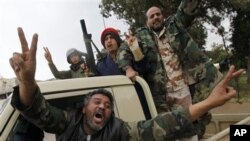International pressure is building to force Libyan leader Moammar Gadhafi to step down as government and opposition forces continue to fight for control of the country. Some Middle East analysts predict a lengthy battle that neither side is likely to win anytime soon.
The forces involved in Libya’s violent crisis appear increasingly entrenched in their positions. Opponents of Moammar Gadhafi backed by mutinous army units have taken the eastern part of the country, while the Libyan leader, supported by security forces and militiamen, retains control of the capital, Tripoli.
"It is a very scary situation in Libya right now. It does not look as though it is going to be able to be resolved relatively peacefully as the uprisings were in Tunisia and Egypt. And it is really unclear right now what we are headed toward. We could be headed toward a period of violence, even of civil war, that will go on for some time inside of Libya," said Michele Dunne, a specialist on Middle East affairs at the Washington-based Carnegie Endowment for International Peace.
The military in Libya is fragmenting, with some officers backing the protestors. Others are following Mr. Gadhafi’s orders and are using force against the opposition.
"Currently, we are seeing a bit of a stalemate," said David Mack, a scholar at The Middle East Institute in Washington. He was a U.S. diplomat in Tripoli when Mr. Gadhafi seized power more than four decades ago.
He says that although rebel and government forces are still fighting, they appear to be close to a standoff. "For now, the insurgents in the eastern part of the country are safe and as long as they do not start fighting among themselves. There is no way that they could be overcome by the forces loyal to Gadhafi. The bad news is that they certainly do not have the capacity among the insurgents in eastern Libya and a few of the towns in the west to effectively move against Gadhafi at this point," he said.
The Internet website GlobalSecurity.org says Mr. Gadhafi purchased hundreds of combat aircraft and thousands of tanks from the Soviet Union during the Cold War, but that much of the equipment has not been properly maintained.
Despite domestic and international calls for him to step down, Mr. Gadhafi has vowed repeatedly that he will not relinquish power.
"I take him at his word that he intends to fight to the last bullet. That is very unfortunate because a lot of innocent Libyans are going to die in the process, I am afraid. I really do not see a possibility of him finding safety outside of Libya, and so I do not think he is likely to be leaving," Mack said.
Western officials are discussing the possibility of imposing a no-fly zone over Libya to prevent the killing of civilians by forces loyal to Mr. Gadhafi.
Libyan air force planes are reported to have attacked ammunition depots to keep military equipment out of the hands of the rebels.
Charles Ries, director of the Center for Middle East Public Policy at the Rand Corporation in Washington, says that if air power is being used to shoot dissidents, the international community might intervene. "If those return or become a standard part of the military force that Gadhafi is trying to use to stay in power, then I suspect that Western powers would rather quickly be able to impose a no-fly zone," he said.
Analysts say there are no strong political or military organizations in Libya, so even if Mr. Gadhafi leaves the country, it is not clear who would rule Libya.
Analysts Warn Conflict in Libya Could be Lengthy




